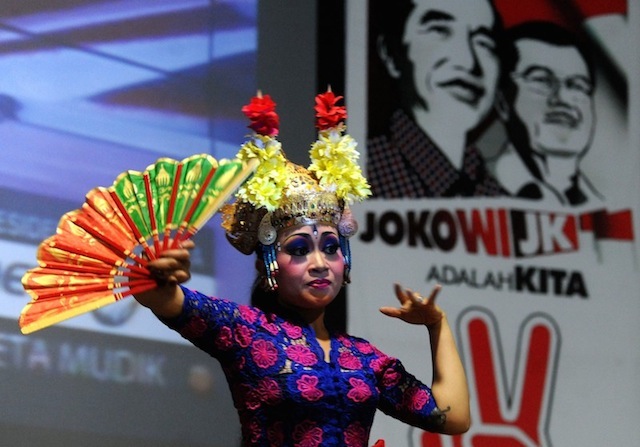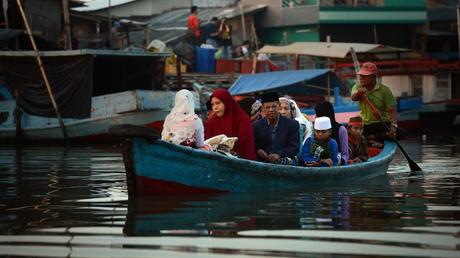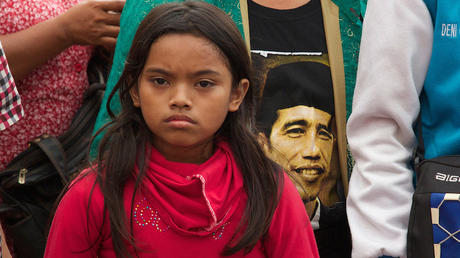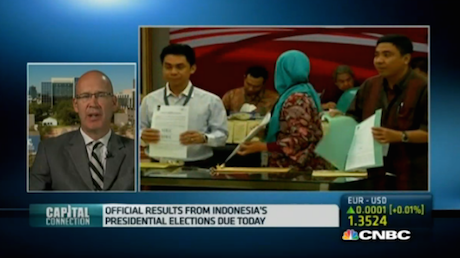
Jakarta governor Joko "Jokowi" Widodo is now Indonesia's president-elect, to take office in October. His rival, Prabowo Subianto, claims widespread cheating is behind Jokowi's 53 per cent to 47 per cent win, but there are no indications the claims are credible.
As such, although Prabowo's camp are contesting the result through Indonesia's constitutional court, it is time for Australia to think seriously about bilateral ties under a Jokowi presidency. Indeed, Prime Minister Tony Abbott has already congratulated Jokowi as president-elect.
Conventional wisdom has long held that no future Indonesian president, Jokowi included, will be as open to ties with Australia as has been the two term incumbent President Susilo Bambang Yudhoyono.
Indonesia's foreign minister told journalists Australia must choose whether it considers Indonesia a friend or an enemy.
But this received wisdom is too pessimistic. Although many of Jokowi's foreign policy views remain unclear, within Indonesia's foreign policy community there remains a significant reservoir of goodwill towards Australia.
Many of them have studied in Australia, including Indonesia's current foreign minister, Marty Natalegawa, or have visited as officials. Dino Patti Djalal, speaking in a personal capacity before being appointed deputy foreign minister, told me Australia will be the Western country closest to Indonesia, in terms of political sympathy and diplomatic closeness. Others said Australia and Indonesia have typically had each others' backs, or that Australia's positive image far outweighed its negatives.
These views could take on additional significance during Jokowi's first five-year term, because of his foreign affairs inexperience. Having served as a city mayor and a governor, Jokowi is likely to choose to delegate much of Indonesia's international relations to a career diplomat foreign minister.
Australia needs to rethink
However, this goodwill towards Australia is tempered by a perception among many of the same foreign policy community of Australian arrogance in its dealings with Indonesia. Overcoming this perception is an immediate challenge for Australia, and reminds us much depends on how Australia itself handles bilateral relations under a new president.
Senior Indonesians describe this arrogance as a belief within the Australian government that problems with Indonesia can be fixed with money and aid; as well as racist, supercilious attitudes towards Indonesia among the wider public. Indeed, Indonesia's foreign minister told journalists Australia must choose whether it considers Indonesia a friend or an enemy.
Jokowi himself raised this issue during the presidential debate on foreign policy, when he rhetorically asked what was wrong with Australia-Indonesia relations.
Answering his own question, Jokowi first highlighted mistrust, but went on to say Australia considers Indonesia to be the weaker country. "[T]he country's honour, the country's standing, must be of special note to the president, lest we be demeaned, lest we be belittled, because we are considered weak and lacking authority," he said.
It is not hard to see what Indonesians are talking about when they complain of Australian arrogance. In turning back asylum boats to Indonesia, including the use of highly visible orange lifeboats, Australia has proceeded with a policy it knows Indonesia detests. On espionage, Abbott's failure to apologise, or give the appearance of a concession, made things worse when reports emerged of Australian spying on Indonesia's top leadership.
Beyond such policy decisions, broader community attitudes also rankle. Lowy Institute opinion polling in 2013 showed only a minority of Australians know Indonesia is a democracy, while just over half consider Indonesia a dangerous source of Islamic terrorism and think Australia is right to worry about its northern neighbour as a military threat.
Taking a long-term approach
I can see for myself how many Australians perceive Indonesia when I get asked: "Doesn't Indonesia need Australian aid?" Or when I meet Australians who think our aid program gives Australia leverage over Indonesia. In fact, Australian aid is a tiny percentage of Indonesia's budget and Indonesia has access to many other sources of financing.
These Australian policies and attitudes are seriously out of step with Indonesia's self-perception. Indonesia views itself as already being a more influential country in regional affairs than Australia, something which many Australians fail to understand. Vice-presidential adviser Dewi Fortuna Anwar, speaking in her personal capacity, told me Australia would be left out in the cold in all of the ASEAN-driven mechanisms such as the East Asia Summit, but for Indonesia advocating on Australia's behalf.
No one would argue Australia should formulate its foreign policy in Indonesia's national interest. But Australia should take fuller consideration of whether it genuinely serves its own national interest when it pushes through policies that we know Indonesia detests.
There is no doubt turning back boats allows Australia to present itself as strong, especially to a domestic audience. The 2014 Lowy Institute poll found 71 per cent of Australians felt boats should be turned back when it was safe to do so, for example. The government may also feel it has more latitude to insist on policies that irritate Indonesia, because it knows political pragmatism consistently pulls Australia and Indonesia back together after each successive row.
But continuing to act in this way is short-sighted. Joko Widodo could well be Indonesian president for the next 10 years, a substantial period of time to set the tone of bilateral relations for the longer term. But Australia and Indonesia will not position themselves to act as equal partners facing an uncertain regional future if the relationship continues to drift between irritation and pragmatism.
A modified version of this piece was first published in the Australian Financial Review on 1 August.




